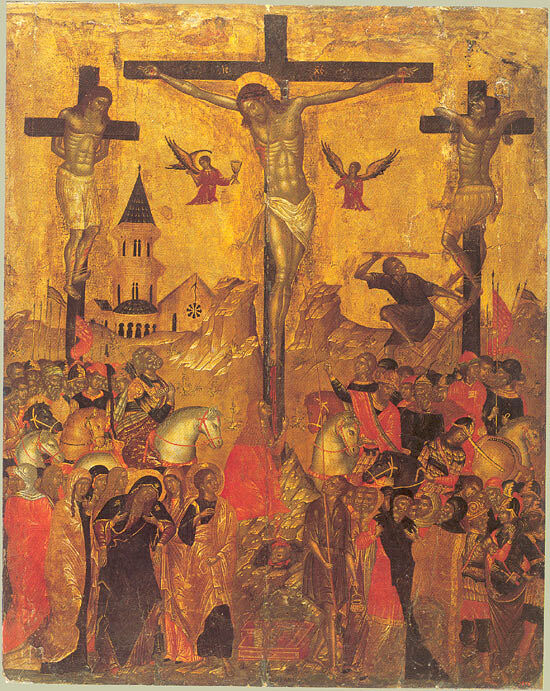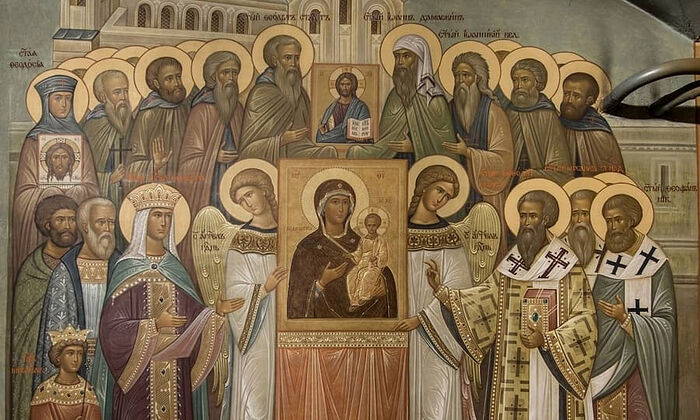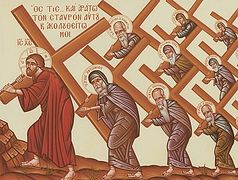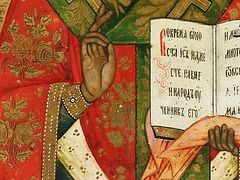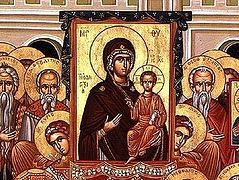In the name of the Father, and the Son, and the Holy Spirit!
“In the midst of two thieves, Thy Cross was found to be a balance of justice; for the one was borne down to hades by the weight of his blasphemy; the other was raised up from his sins to the knowledge of theology...” (Lenten troparion on the ninth hour, at the glory). Thus is it spoken about the Cross of the Lord. The balance of justice is found amidst two thieves; Pilate erected three crosses on Golgotha—two with robbers and one with the Giver of Life. But only the Cross of the Savior was salvation for all mankind; the Cross that stood in the middle is the weapon of peace, the invincible victory—victory over the devil and over death. As for the other two crosses—one was saving for the man who hung upon it, while the other was a ladder to hell.
Two thieves hung on crosses next to the Lord Jesus Christ; one blasphemed Him the whole time and continues to blaspheme, while the other might have begun to blaspheme, but then came to reason, and coming to a knowledge of all his sins, cried out to the Lord: Lord, remember me when thou comest into thy kingdom. And Jesus said unto him, Verily I say unto thee, Today shalt thou be with me in paradise (Lk. 23:42–43). Thus, through the Cross, through suffering, the wise thief believed in the crucified Christ; he believed, as it says, to the knowledge of theology. But when the Lord forgave him his sins, the thief came to know in Him the Son of God Himself, and understood that this Man Who hung ingloriously and in dishonor is the glorious King of Glory; he understood that He Who now seems helpless and weak is the Almighty Creator and Ruler of the Universe Himself. Thus did the eyes of the mind, the eyes of the soul open for that thief who hung on the right side, to which he came through repentance, through humility. So also did Christ lower Himself more than all men; He lowered Himself in order to erase and destroy Adam’s sin of pride. So also the thief, humbly acknowledging his sins, asked the Lord for forgiveness, and through this the Lord appeared to him in all His glory. But the other thief who hung on the left side, oshuyu as it is in Church Slavonic, blasphemed Him the whole time, because he acknowledged that he was sinful, that he was a criminal, that he had violated both human and divine laws, but he did not want to repent, he did not want to humble himself. And he was blaspheming the very laws that he had violated, he blasphemed the Lawgiver Himself, Who gave the laws of nature, Who placed a conscience in people, according to which they write their human laws, albeit not always in agreement with the conscience; he blasphemed Him and continued to blaspheme until the weight of his blasphemy pulled his soul down into hell.
Here are the two paths that lie before people. Before us lies the Life-creating Cross of the Lord. The Lord said, “If any man will come after me, let him take up his cross and follow Me” (cf. Mt. 16:24; Mk. 8:34; Lk. 9:23). Follow Him where? First through suffering, just as Christ suffered, and then he will enter with Christ into the Eternal Kingdom, the Kingdom of Heaven, where the Lord Jesus Christ sits on His throne. There is no path other than following after Christ. And the thief who hung on the right side came to know God, and his soul went after Him. Of course he could not then miraculously change—this is not necessary; in his soul he followed after Christ, knew God in Him Who humbled Himself for the sake of man’s salvation; he humbled himself, acknowledged his sins, and went with Christ to paradise.
Before us are the paths of two thieves. What path will we take? Mankind has always taken one or the other of these paths. The Cross of the Lord was a stumbling block to the Jews, and to the Hellenes—that is, to the pagans—foolishness. How can one worship an instrument of humiliation, of punishment? They didn’t understand that with this instrument the Lord saved all mankind from the devil’s kingdom, from the kingdom of sin, from eternal destruction. For the Jews the Cross of the Lord was also a stumbling block; they wished to see their Messiah as the King of Glory, as an earthly king, who would raise the Jewish race. And so the Cross upon which Christ was crucified seemed to them a stumbling block, and to the Greeks foolishness, but to us it is Christ the power of God, and the wisdom of God. What for some was destruction became salvation for others.
The Cross of the Lord divides people into two camps. Some believed in Christ, others stumbled on the stumbling stone and persecuted the Church of Christ, the Body of Christ, the Head of which is the Lord Jesus Christ Himself. The Church of Christ is the Body of Christ; He Himself heads it and feeds the faithful with His Body and Blood, He feeds the sons and daughters of His Church, so that we should be one with Christ both bodily and spiritually. We unite with Christ bodily through Divine Communion, and we should cleave to Him in soul and immediately follow His commandments.
We all sin, but some sin and repent, while others blaspheme all the laws that they violate. That is how it was in antiquity, when Arius and other heretics rejected the dogmas of the Holy Church, and then the faithful often suffered. The faithful suffered when there were impious rulers, who sent them to exile. Thus St. Athanasius the Great spent twenty of his forty-year episcopacy in exile. And other holy hierarchs also suffered for the truth, as did also many of the faithful; nevertheless, they saved themselves in the purity of Orthodoxy and opened gates of eternal life, the gates of the Kingdom of Heaven. The unbelievers often triumphed, often trampled upon Christ’s Church, but then came the time for their destruction and fall—and their souls were sent not to the Kingdom of Heaven but to eternal torments in hell, just as Christ once sent Herod’s soul to hell as well as the souls of others who sought His soul.
Before us lies either the path of salvation, or the path of destruction. Christians also stumbled on the Cross during the time of iconoclasm, when they began to persecute the holy icons, when they began to degrade other sacred objects, and the Cross of the Lord. And these are those who called themselves “right believing”, even considering themselves Orthodox. Thus, the iconoclastic heresy ruled for 150 years until it was finally crushed.
On the day of the Triumph of Orthodoxy we celebrate the victory of Christ over iconoclasm and over all demons. The Cross of the Lord separated the believers from the unbelievers, those who walked the path of salvation from those who walked the path of destruction. Today’s iconoclast-Protestants and others who reject the holy icons likewise reject the Cross of Christ. They are ready to allow in their homes pretty images of some Gospel events, but they reject the veneration of holy icons, which reminds us that salvation is acquired by the hard and narrow path that our Lord Jesus Christ Himself walked; the path of struggle with our sins and vices, the path of fasting and prayer. This is not recognized by those who wish to see in Christianity only something rosy and beautiful, where you can enter into eternal bliss without any effort, without forcing yourself, without any struggle with your sins. They walk the path of the thief who hung at the left: They reject all the laws that the Lord Himself gave with His own lips and sent the apostles to preach throughout the inhabited world; they reject those rules and writings that the Orthodox Church sacredly preserves.
And so through the Cross, some are saved to the knowledge of theology, to the knowledge of the truth, while others through the weight of their blasphemy go down to the torments of hell. Such a broad path stands before us Orthodox, and here there are temptations that divide the faithful, if they want to walk the path that Christ showed them.
We all sin, we all violate Christ’s commandments and the laws of the Holy Church, but some recognize that they are sinful in what they violate and repent of their sins, while others instead reject the laws themselves and do not want to submit to them, saying that these laws are outdated, no longer needed, and that they are supposedly smarter than those who gave us the laws of the Church—laws which the Lord Himself gave through his apostles and holy hierarchs. So, there are two paths before you: the path of the wise thief and the path of the one who went down into hades by the weight of his blasphemy.
Here before us are also those eternal icons. Some are ready to accept images as long as they are well-written, if they are beautiful and delight the eyes, while others honor those icons whereon the saints are depicted suffering, where their martyric suffering is shown, their fasting and prayers, the outward unsightliness but inner nobility seen on these sacred images. These, brothers and sisters, are the paths of the two thieves. Some desire salvation, while others desire only pleasures in this world; and when they are withheld from them, they blaspheme the laws given to us for our salvation.
Now also various divisions can arise for us. Because the laws of Christ’s Church are immutable, Christians should submit to the laws and rules of the Church independently of how they are viewed by others, by society around us, be it favorably or negatively. Those faithful to Christ walk the path of those laws and rules that the Holy Church sacredly preserves. But those who desire superflous comforts and joys in this earthly world, which will perish sooner or later, prefer other laws: not the laws of the Church, but those that allow them to live as they like and think as they like, placing their own will above the spirit of the Church, which was given by the Lord God Himself. And they call on others to follow their path.
Perhaps, brothers and sisters, soon troubles will find you here, and some of you will be called to take the path of rejecting the holy laws and submit only to those laws that are given by human authority. Fear this path! Fear this path, which the thief took who hung on the left side—for the weight of blasphemy, the weight of blaspheming Christ took him down to eternal destruction. And those who blaspheme the Church’s laws blaspheme Christ Himself, Who is the Head of the Church; for the laws of the Church were given by the Holy Spirit through the apostles. And local laws were based on those same laws and canons of the Church. Let’s not think ourselves wiser than the holy hierarchs who established the rules of the Church; let’s not consider ourselves greatly wise. Let us humbly cry out with the wise thief: Remember me, O Lord, in Thy Kingdom!
Pray for the forgiveness of sins. If we depart from the laws of the Church, if we continually violate them, pray that the Lord would have mercy and lead us with the thief to the Kingdom of Heaven. Then we will not take the path that the impious thief took, remaining impious to the end and falling into hell. May the Lord deliver you all from this. Amen.

